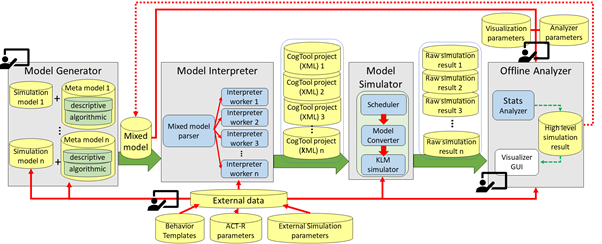iCSS Director Professor Shujun Li publishes in top journal
6 May 2021

Professor Shujun Li, Director of the Institute of Cyber Security for Society (iCSS) and Professor of Cyber Security at School of Computing, has co-authored an article entitled 'CogTool+: Modeling human performance at large scale', which has recently been published in the top tier computer science journal ACM Transactions on Computer-Human Interaction. The journal is considered the No 1 journal in the sub-area of computer-human interaction and is ranked as an A* journal by the Computing Research and Education Association of Australasia (CORE).
Cognitive models and software tools have been widely used by researchers in multiple disciplines to simulate how human users conduct different kinds of tasks that require cognitive workload. For example, they can be used to automatically evaluate the usability of computer security systems for user authentication, without the need to conduct experiments involving human participants. CogTool is one of the widely used cognitive modelling tools, however, despite its usefulness, large-scale modelling tasks can still be very challenging due to the amount of manual work users of the tool still need to do. To address this challenge of modelling and simulating large-scale systems with reduced manual work, Professor Shujun Li and co-authors Dr Haiyue Yuan (Research Fellow at the University of Surrey) and Dr Patrice Rusconi (Lecturer in Social Psychology at the University of Messina in Italy, formerly Lecturer in Psychology at the University of Surrey) have proposed CogTool+, a new cognitive modelling framework and a software prototype developed on top of CogTool.
CogTool+ enhances the capability of CogTool for supporting large-scale modelling and simulation tasks by adding the following new features: (1) a higher level of automation; (2) the possibility to add algorithmic components such as randomised user interface elements; (3) using external data to inform the modelling and simulation process; and (4) a clearer separation of tasks, allowing user interface (UI) designers, programmers and psychologists to work together more effectively. CogTool+ also supports mixed cognitive models, which are required in many large-scale modelling tasks. It provides an offline analyser of simulation results. In order to show how CogTool+ can reduce human efforts required for large-scale modelling tasks, the researchers illustrate how it works using a pedagogical example about a simple graphical user authentication system and demonstrate its improved performance by applying it to modelling tasks of two real-world user authentication systems involving more complicated procedures.
The full article is freely available at the publisher's website:
https://doi.org/10.1145/3447534
The source code of the CogTool+ and the modelling examples shown in the article are made open source on GitHub: https://github.com/hyyuan/cogtool_plus. Readers who are interested in learning more about cognitive modelling are recommended to read the same researchers' monograph published by Springer Nature in 2020: Cognitive Modeling for Automated Human Performance Evaluation at Scale.
On 21 May 11am-12pm, the first author of the article, Dr Haiyue Yuan, will give a talk at the iCSS Seminar Series to introduce CogTool+. More details can be found at https://www.kent.ac.uk/events/event/48282/cogtool-modeling-human-performance-at-large-scale